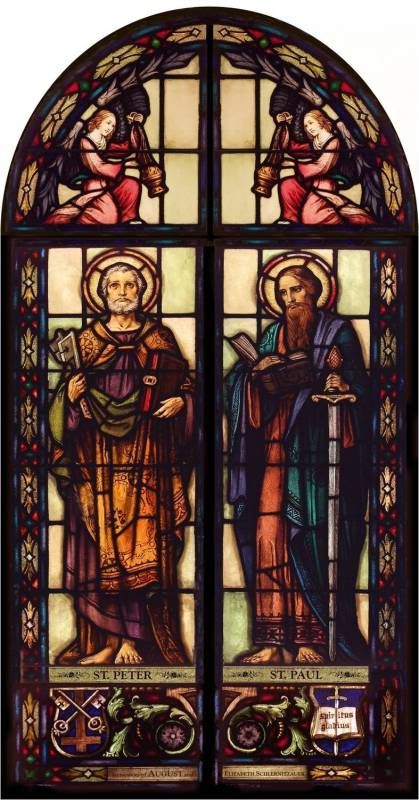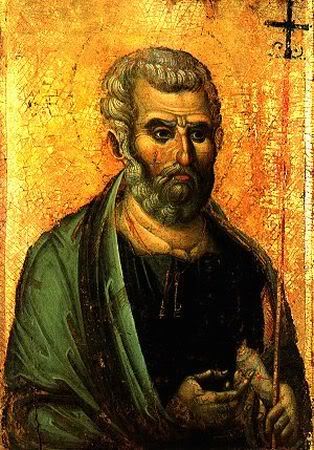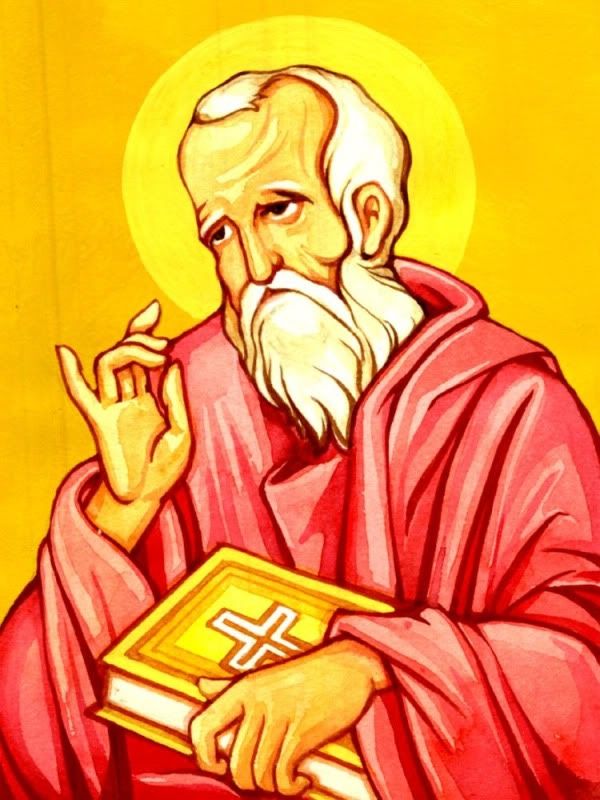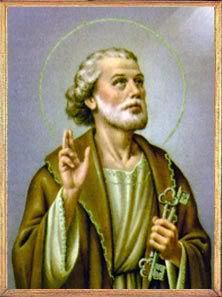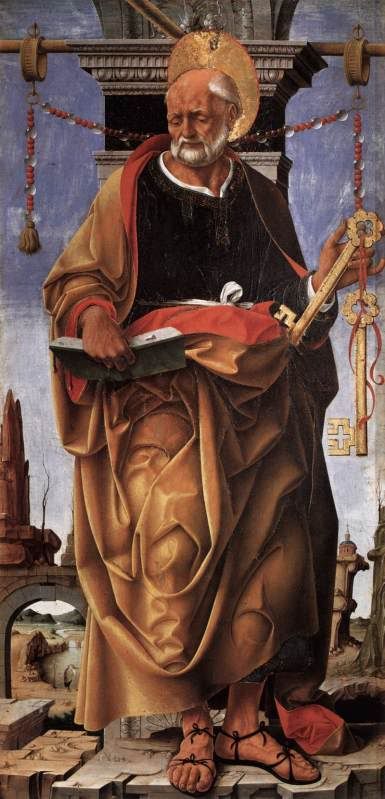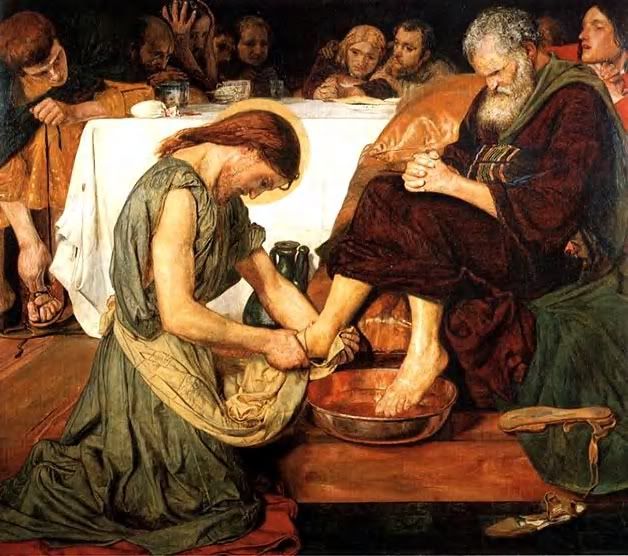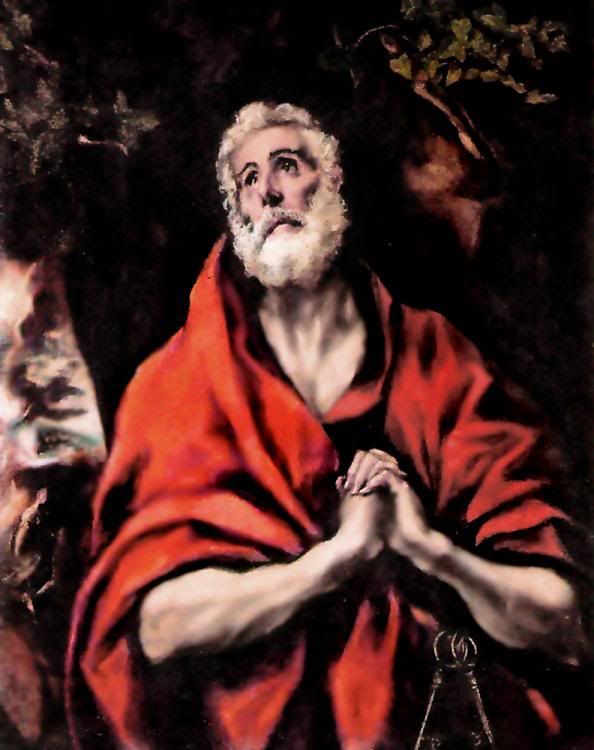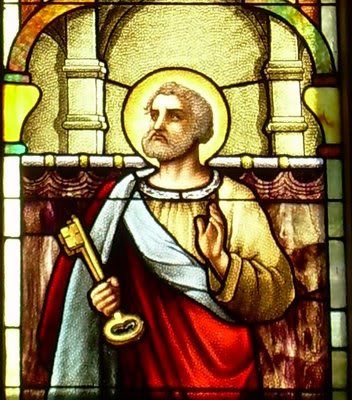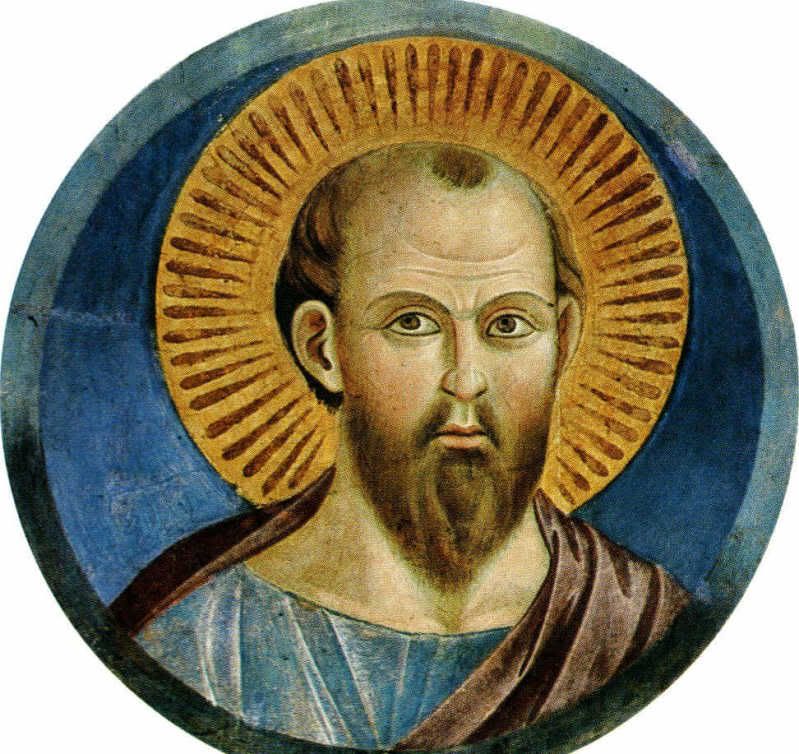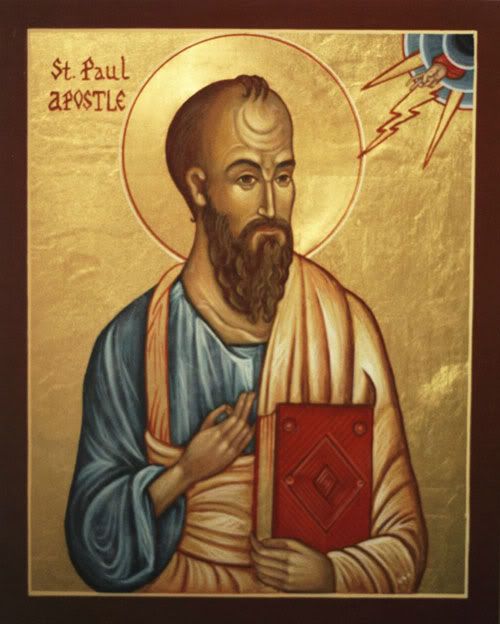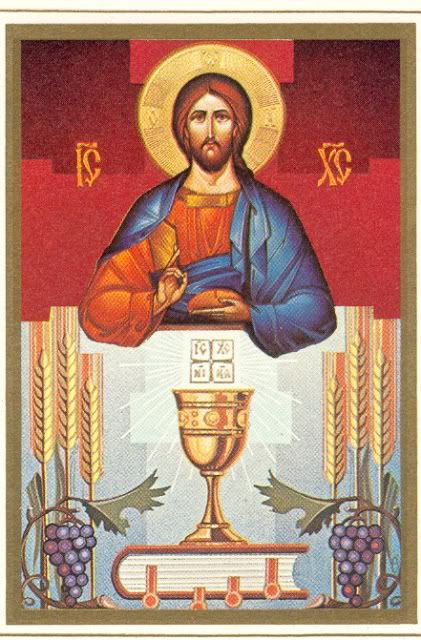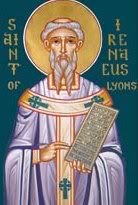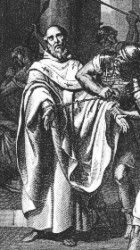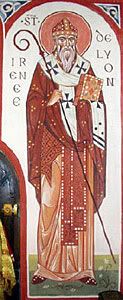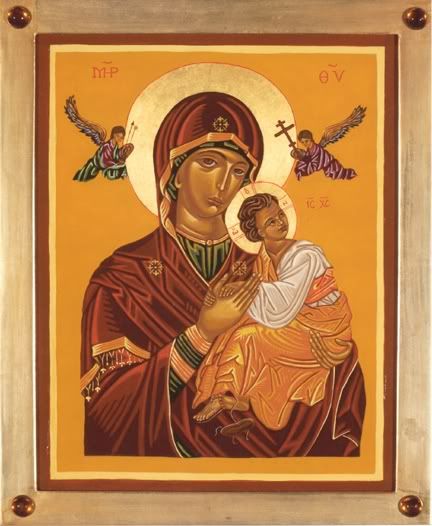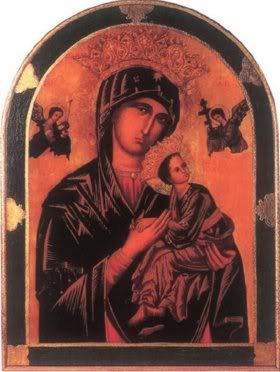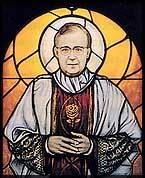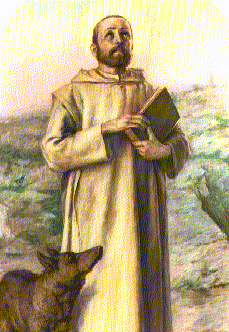Today, June 30, we celebrate the feast of the First Martyrs of Rome (died 64-68), brave and courageous Christians who suffered for their faith. Following the Ascension of Christ, the disciples had preached the Gospel, spreading throughout the region. Some, as we have read, settled in Rome, where they continued to convert and baptize in the name of Jesus. This was most unsettling to the Emperor, as it led to conflict between the majority of Rome’s citizens—Jews—and the new Christians.
In approximately 49 A.D., the historian Suetonius recorded that that Christians were expelled from Rome by the Emperor Claudius, due to disturbances that he attributed to Christ. However, it appears likely that after the Emperor’s death, the Christian citizens of Rome returned, only to be persecuted in a much crueler and vindictive manner by Emperor Nero.
In July of 64 A.D., a large fire broke out in Rome, destroying nearly half of the city. The fire was blamed on the Emperor, who is said to have wanted to enlarge his palace. Nero quickly blamed the Christians, who he accused of “hatred of the human race” and likened to modern-day terrorists. As a result, public outcry was minimal when Nero ordered thousands to be put to death— some were covered with the skins of animals and thrown to wild dogs to be torn apart; others were crucified and at sunset were covered in oil and used as human torches to light the path of the Emperor’s chariot. Saints Peter and Paul were among those martyred. Needless to say, eventually the good people of Rome took offense to Nero’s rampant persecution of Christians, and following a revolt by the military, he took his own life in 68 A.D.
The Roman historian Tacitus tells the story of the first Martyrs of Rome:
"Yet no human effort, no princely largess nor offerings to the gods could make that infamous rumor disappear that Nero had somehow ordered the fire. Therefore, in order to abolish that rumor, Nero falsely accused and executed with the most exquisite punishments those people called Christians, who were infamous for their abominations. The originator of the name, Christ, was executed as a criminal by the procurator Pontius Pilate during the reign of Tiberius; and though repressed, this destructive superstition erupted again, not only through Judea, which was the origin of this evil, but also through the city of Rome, to which all that is horrible and shameful floods together and is celebrated. Therefore, first those were seized who admitted their faith, and then, using the information they provided, a vast multitude were convicted, not so much for the crime of burning the city, but for hatred of the human race. And perishing they were additionally made into sports: they were killed by dogs by having the hides of beasts attached to them, or they were nailed to crosses or set aflame, and, when the daylight passed away, they were used as nighttime lamps. Nero gave his own gardens for this spectacle and performed a Circus game, in the habit of a charioteer mixing with the plebs or driving about the racecourse. Even though they were clearly guilty and merited being made the most recent example of the consequences of crime, people began to pity these sufferers, because they were consumed not for the public good but on account of the fierceness of one man."
Years later, Pope Clement I, the third successor of Saint Peter, wrote in his encyclical:
“But not to dwell upon ancient examples, let us come to the most recent spiritual heroes. Let us take the noble examples furnished in our own generation. Through envy and jealousy, the greatest and most righteous pillars [of the Church] have been persecuted and put to death. Let us set before our eyes the illustrious apostles. Peter, through unrighteous envy, endured not one or two, but numerous labors and when he had at length suffered martyrdom, departed to the place of glory due to him. Owing to envy, Paul also obtained the reward of patient endurance, after being seven times thrown into captivity, compelled to flee, and stoned. After preaching both in the east and west, he gained the illustrious reputation due to his faith, having taught righteousness to the whole world, and come to the extreme limit of the west, and suffered martyrdom under the prefects. Thus was he removed from the world, and went into the holy place, having proved himself a striking example of patience.
To these men who spent their lives in the practice of holiness, there is to be added a great multitude of the elect, who, having through envy endured many indignities and tortures, furnished. us with a most excellent example. Through envy, those women, the Danaids and Dircae, being persecuted, after they had suffered terrible and unspeakable torments, finished the course of their faith with steadfastness, and though weak in body, received a noble reward. Envy has alienated wives from their husbands, and changed that saying of our father Adam, "This is now bone of my bones, and flesh of my flesh." Envy and strife have overthrown great cities and rooted up mighty nations.
These things, beloved, we write unto you, not merely to admonish you of your duty, but also to remind ourselves. For we are struggling on the same arena, and the same conflict is assigned to both of us. Wherefore let us give up vain and fruitless cares, and approach to the glorious and venerable rule of our holy calling. Let us attend to what is good, pleasing, and acceptable in the sight of Him who formed us. Let us look steadfastly to the blood of Christ, and see how precious that blood is to God, which, having been shed for our salvation, has set the grace of repentance before the whole world.”
The lives of the First Martyrs of Rome remind us that we are called to serve the Lord, regardless of the earthly situations we find ourselves in. We are precious to Him, as Pope Clement I wrote, and through our lives, works, and actions, we must demonstrate to the world how precious the Lord is to us.
Father, you sanctified the Church of Rome with the blood of its first martyrs. May we find strength from their courage and rejoice in their triumph. We ask this through our Lord Jesus Christ, your Son, who lives and reigns with you and the Holy Spirit, one God, for ever and ever. Amen.
Inspired by the origins and spiritual history of the Holy Rosary, we continue our meditation on the psalms, one each day, in order, for 150 days.
Today’s Psalm: Psalm 66: Praise of God, Israel’s Deliverer
1 Shout with joy to God, all the earth!
2 Sing the glory of his name;
make his praise glorious!
3 Say to God, "How awesome are your deeds!
So great is your power
that your enemies cringe before you.
4 All the earth bows down to you;
they sing praise to you,
they sing praise to your name."
5 Come and see what God has done,
how awesome his works in man's behalf!
6 He turned the sea into dry land,
they passed through the waters on foot—
come, let us rejoice in him.
7 He rules forever by his power,
his eyes watch the nations—
let not the rebellious rise up against him.
8 Praise our God, O peoples,
let the sound of his praise be heard;
9 he has preserved our lives
and kept our feet from slipping.
10 For you, O God, tested us;
you refined us like silver.
11 You brought us into prison
and laid burdens on our backs.
12 You let men ride over our heads;
we went through fire and water,
but you brought us to a place of abundance.
13 I will come to your temple with burnt offerings
and fulfill my vows to you-
14 vows my lips promised and my mouth spoke
when I was in trouble.
15 I will sacrifice fat animals to you
and an offering of rams;
I will offer bulls and goats.
16 Come and listen, all you who fear God;
let me tell you what he has done for me.
17 I cried out to him with my mouth;
his praise was on my tongue.
18 If I had cherished sin in my heart,
the Lord would not have listened;
19 but God has surely listened
and heard my voice in prayer.
20 Praise be to God,
who has not rejected my prayer
or withheld his love from me!
Day 181 of 365
Prayer Intentions: Courage to live our faith for the world to see; Those unjustly persecuted.
Requested Intentions: For a recovery and sanctification (X); For a daughter struggling with disease and illness (T); For all lost children (I); Prosperity, health, healing, and conversion for a family (M); Health and healing of a mother (A); Healing of heart and mind (T); Healing of a new relationship before marriage (K); Healing of a relationship (T); Eternal rest for the dearly departed, end to financial struggles, successful sale of home, ability to travel on pilgrimage (L); For healing of a stomach illness (L); For the repose of the soul of a sister (C); Vocational security for family, Financial security for daughter beginning college (M); Vocational guidance, courage and strength (I); Health for an ailing nephew (A); Those suffering from depression (J); Successful adoption (S); Healing of a father battling cancer (S).
Psalm: Psalm 66: Praise of God, Israel’s Deliverer
Why pray the Rosary every day for a year?
Each time the Blessed Virgin has appeared-- whether it be to Saint Bernadette Soubirous at Lourdes; to Lucia, Jacinta, and Francisco at Fatima; or to Mariette Beco at Banneux-- she has asserted the importance, saving grace, and power of praying the Holy Rosary on a daily basis. Based upon her words, the Rosary is penance and conversion for sinners, a pathway to peace, an end to war, and a powerful act of faith in Jesus Christ. Pope Paul VI presented the Rosary as a powerful means to reach Christ "not merely with Mary but indeed, insofar as this is possible to us, in the same way as Mary, who is certainly the one who thought about Him more than anyone else has ever done."
To show us how this is done, perhaps no one has been more eloquent than the great Cardinal Newman, who wrote: "The great power of the Rosary consists in the fact that it translates the Creed into Prayer. Of course, the Creed is already in a certain sense a prayer and a great act of homage towards God, but the Rosary brings us to meditate again on the great truth of His life and death, and brings this truth close to our hearts. Even Christians, although they know God, usually fear rather than love Him. The strength of the Rosary lies in the particular manner in which it considers these mysteries, since all our thinking about Christ is intertwined with the thought of His Mother, in the relations between Mother and Son; the Holy Family is presented to us, the home in which God lived His infinite love."
As Mary said at Fatima, "Jesus wants to use you to make Me known and loved. He wishes to establish the devotion to My Immaculate Heart throughout the world. I promise salvation to whoever embraces it; these souls will be dear to God, like flowers put by Me to adorn his throne."

Today, June 29, we celebrate the Feast of Saint Peter and Paul, foundations of the Church, and martyrs for the faith. Instrumental in the formation and propagation of the faith, both Peter and Paul worked tirelessly after the crucifixion to continue spreading the Good News of Christ. While the Scriptures do not record the deaths of Peter or Paul, from an early date it has been said that they were martyred in Rome at the command of Emperor Nero, and buried there. As a Roman citizen, Paul was beheaded with a sword, whereas Peter was sentenced to crucifixion. However, proclaiming that he was not “worthy” of the same death that Christ endured, Peter was crucified with his head pointed downward.
Saint Augustine wrote of these holy men: “Both apostles share the same feast day, for these two were one; and even though they suffered on different days, they were as one. Peter went first, and Paul followed. And so we celebrate this day made holy for us by the apostles' blood. Let us embrace what they believed, their life, their labors, their sufferings, their preaching, and their confession of faith.”
Almighty God, whose blessed apostles Peter and Paul glorified you by their martyrdom: Grant that your Church, instructed by their teaching and example, and knit together in unity by your Spirit, may ever stand firm upon the one foundation, which is Jesus Christ our Lord; who lives and reigns with you, in the unity of the Holy Spirit, one God, for ever and ever.
Saint Peter (1-64), disciple of Christ, first Pope, and “rock” of the Church., was born Simeon, but renamed by Christ to reflect his special role in the formation of the Church. He later confirmed his “new” name, and endowed him with the powers of the keys of heaven:
16Simon Peter answered, "You are the Christ, the Son of the living God."
17Jesus replied, "Blessed are you, Simon son of Jonah, for this was not revealed to you by man, but by my Father in heaven. 18And I tell you that you are Peter [translated as “the rock”], and on this rock I will build my church, and the gates of Hades will not overcome it. 19I will give you the keys of the kingdom of heaven; whatever you bind on earth will be bound in heaven, and whatever you loose on earth will be loosed in heaven." (Matthew 16: 16-19)
Jesus also specifically charged Saint Peter with the task of shepherding His flock as first Vicar of the Church. In Saint Peter and his successors, we have a visible sign of unity and communion in faith and charity:
15When they had finished eating, Jesus said to Simon Peter, "Simon son of John, do you truly love me more than these?"
"Yes, Lord," he said, "you know that I love you."
Jesus said, "Feed my lambs."
16Again Jesus said, "Simon son of John, do you truly love me?"
He answered, "Yes, Lord, you know that I love you."
Jesus said, "Take care of my sheep."
17 The third time he said to him, "Simon son of John, do you love me?"
Peter was hurt because Jesus asked him the third time, "Do you love me?" He said, "Lord, you know all things; you know that I love you."
Jesus said, "Feed my sheep. (John 21: 15-17)
Peter was born in Bethsaida on the Sea of Galilee. Like his younger brother Andrew, he was a professional fisherman and dwelt at Capernaum, where Jesus would stay, performing miracles, whenever he was preaching in that area. Following the miraculous catch of fish that Christ used to make them “fishers of men,” together with his brothers John and Andrew, Peter felt the call to become the first of Jesus' disciples.
Following his encounter with Jesus, Peter’s life changed dramatically. We know that he left his wife, family, and job to follow Christ. He served as the leader of the disciples, especially following the crucifixion, but beforehand as well. Peter occupied a privileged station as spokesperson for the group, as well as selection to be present at the Transfiguration and the Agony in the Garden. Somewhat quick to anger and temperamental, Peter’s words and deeds sometimes got him into trouble, but also set the stage for his thrice-over denial of Jesus, a lesson which led to great humility and prepared him for his position as Pope.
After the Ascension of Christ, we know that Peter took a leading role, embracing the office of shepherd that had been entrusted to him. He delivered the first sermon on Pentecost, during the descent of the Holy Spirit, and confirmed the first Gentiles into the Church:
42He commanded us to preach to the people and to testify that he is the one whom God appointed as judge of the living and the dead. 43All the prophets testify about him that everyone who believes in him receives forgiveness of sins through his name." (Acts 10: 42-43)
But much of Saint Peter’s life is lost to history. We know that he was present at the Council of Jerusalem (where he gave support to preaching to the Gentiles, leading to the universality of the Church), became the first bishop of Antioch, received and visited with saint Paul, and labored in Rome as an apostle. He is responsible for appointed the replacement of Judas Iscariot, and was the first to perform miracles in the name of the Lord. He further wrote two epistles, the first Papal Encyclicals of the Church.
16We did not follow cleverly invented stories when we told you about the power and coming of our Lord Jesus Christ, but we were eyewitnesses of his majesty. 17For he received honor and glory from God the Father when the voice came to him from the Majestic Glory, saying, "This is my Son, whom I love; with him I am well pleased."18We ourselves heard this voice that came from heaven when we were with him on the sacred mountain. (2 Peter 1: 16-18)
Saint Peter was imprisoned by King Herod Agrippa, and was miraculously freed by an angel. Rather than turn from his apostolic mission, he returned to Jerusalem, traveled teaching the Good News, and returned to Rome (where he labored for 25 years, building the Church of God). He was crucified by Emperor Nero on Vatican Hill, and his relics are now enshrined under the high alter of Saint Peter’s Basilica. From the earliest days of the Church, Peter was recognized as the Prince of the Apostles and the first Supreme Pontiff. His see, Rome, has thus enjoyed the position of primacy over the entire Catholic Church.
O Glorious Saint Peter, because of your vibrant and generous faith, sincere humility and flaming love our Lord honored you with singular privileges and especially leadership of the whole Church. Obtain for us the grace of a living faith, a sincere loyalty to the Church, acceptance of all her teaching, and obedience to all her precepts. Let us thus enjoy an undisturbed peace on earth and everlasting happiness in heaven. Amen.
Saint Paul (10-67), was born in Tarsus, and was educated as a Jewish Talmudic student. He worked as a tentmaker, and actively persecuted the Church for years until receiving a divine message from the Lord on the road to Damascus. Following his conversion, Saint Paul went on to become the most prolific writer and preacher of the early Church, traveling throughout the Middle East and Asia Minor, converting many. Selected to bring Christ's name to all peoples, he is the greatest missionary of all time, the advocate of pagans, the Apostle of the Gentiles.
“This man is my chosen instrument to carry my name before the Gentiles and their kings and before the people of Israel.” (Acts 9: 15b)
I have written about the life, conversion, and martyrdom of Saint Paul previously, on the feast of his conversion (see here).
Glorious St. Paul,
Most zealous Apostle,
Martyr for the love of Christ,
Give us a deep faith,
A steadfast hope,
A burning love for our Lord;
So that we can proclaim with you,
“It is no longer I who live, but Christ
who lives in me.”
Help us to become apostles
Serving the Church with a pure heart,
Witnesses to her truth and beauty
Amidst the darkness of our days.
With you we praise God our Father:
“To Him be the glory, in the Church
and in Christ, now and forever.”
Amen.
Inspired by the origins and spiritual history of the Holy Rosary, we continue our meditation on the psalms, one each day, in order, for 150 days.
Today’s Psalm: Psalm 65: Thanksgiving for God’s Blessings
1 Praise awaits you, O God, in Zion;
to you our vows will be fulfilled.
2 O you who hear prayer,
to you all men will come.
3 When we were overwhelmed by sins,
you forgave our transgressions.
4 Blessed are those you choose
and bring near to live in your courts!
We are filled with the good things of your house,
of your holy temple.
5 You answer us with awesome deeds of righteousness,
O God our Savior,
the hope of all the ends of the earth
and of the farthest seas,
6 who formed the mountains by your power,
having armed yourself with strength,
7 who stilled the roaring of the seas,
the roaring of their waves,
and the turmoil of the nations.
8 Those living far away fear your wonders;
where morning dawns and evening fades
you call forth songs of joy.
9 You care for the land and water it;
you enrich it abundantly.
The streams of God are filled with water
to provide the people with grain,
for so you have ordained it.
10 You drench its furrows
and level its ridges;
you soften it with showers
and bless its crops.
11 You crown the year with your bounty,
and your carts overflow with abundance.
12 The grasslands of the desert overflow;
the hills are clothed with gladness.
13 The meadows are covered with flocks
and the valleys are mantled with grain;
they shout for joy and sing.
Day 180 of 365
Prayer Intentions: Zeal for the Lord; True conversion; Courage and steadfastness.
Requested Intentions: For a recovery and sanctification (X); For a daughter struggling with disease and illness (T); For all lost children (I); Prosperity, health, healing, and conversion for a family (M); Health and healing of a mother (A); Healing of heart and mind (T); Healing of a new relationship before marriage (K); Healing of a relationship (T); Eternal rest for the dearly departed, end to financial struggles, successful sale of home, ability to travel on pilgrimage (L); For healing of a stomach illness (L); For the repose of the soul of a sister (C); Vocational security for family, Financial security for daughter beginning college (M); Vocational guidance, courage and strength (I); Health for an ailing nephew (A); Those suffering from depression (J); Successful adoption (S); Healing of a father battling cancer (S).
Psalm: Psalm 65: Thanksgiving for God’s Blessings
Saint Augustine wrote of these holy men: “Both apostles share the same feast day, for these two were one; and even though they suffered on different days, they were as one. Peter went first, and Paul followed. And so we celebrate this day made holy for us by the apostles' blood. Let us embrace what they believed, their life, their labors, their sufferings, their preaching, and their confession of faith.”
Almighty God, whose blessed apostles Peter and Paul glorified you by their martyrdom: Grant that your Church, instructed by their teaching and example, and knit together in unity by your Spirit, may ever stand firm upon the one foundation, which is Jesus Christ our Lord; who lives and reigns with you, in the unity of the Holy Spirit, one God, for ever and ever.
Saint Peter (1-64), disciple of Christ, first Pope, and “rock” of the Church., was born Simeon, but renamed by Christ to reflect his special role in the formation of the Church. He later confirmed his “new” name, and endowed him with the powers of the keys of heaven:
16Simon Peter answered, "You are the Christ, the Son of the living God."
17Jesus replied, "Blessed are you, Simon son of Jonah, for this was not revealed to you by man, but by my Father in heaven. 18And I tell you that you are Peter [translated as “the rock”], and on this rock I will build my church, and the gates of Hades will not overcome it. 19I will give you the keys of the kingdom of heaven; whatever you bind on earth will be bound in heaven, and whatever you loose on earth will be loosed in heaven." (Matthew 16: 16-19)
Jesus also specifically charged Saint Peter with the task of shepherding His flock as first Vicar of the Church. In Saint Peter and his successors, we have a visible sign of unity and communion in faith and charity:
15When they had finished eating, Jesus said to Simon Peter, "Simon son of John, do you truly love me more than these?"
"Yes, Lord," he said, "you know that I love you."
Jesus said, "Feed my lambs."
16Again Jesus said, "Simon son of John, do you truly love me?"
He answered, "Yes, Lord, you know that I love you."
Jesus said, "Take care of my sheep."
17 The third time he said to him, "Simon son of John, do you love me?"
Peter was hurt because Jesus asked him the third time, "Do you love me?" He said, "Lord, you know all things; you know that I love you."
Jesus said, "Feed my sheep. (John 21: 15-17)
Peter was born in Bethsaida on the Sea of Galilee. Like his younger brother Andrew, he was a professional fisherman and dwelt at Capernaum, where Jesus would stay, performing miracles, whenever he was preaching in that area. Following the miraculous catch of fish that Christ used to make them “fishers of men,” together with his brothers John and Andrew, Peter felt the call to become the first of Jesus' disciples.
Following his encounter with Jesus, Peter’s life changed dramatically. We know that he left his wife, family, and job to follow Christ. He served as the leader of the disciples, especially following the crucifixion, but beforehand as well. Peter occupied a privileged station as spokesperson for the group, as well as selection to be present at the Transfiguration and the Agony in the Garden. Somewhat quick to anger and temperamental, Peter’s words and deeds sometimes got him into trouble, but also set the stage for his thrice-over denial of Jesus, a lesson which led to great humility and prepared him for his position as Pope.
After the Ascension of Christ, we know that Peter took a leading role, embracing the office of shepherd that had been entrusted to him. He delivered the first sermon on Pentecost, during the descent of the Holy Spirit, and confirmed the first Gentiles into the Church:
42He commanded us to preach to the people and to testify that he is the one whom God appointed as judge of the living and the dead. 43All the prophets testify about him that everyone who believes in him receives forgiveness of sins through his name." (Acts 10: 42-43)
But much of Saint Peter’s life is lost to history. We know that he was present at the Council of Jerusalem (where he gave support to preaching to the Gentiles, leading to the universality of the Church), became the first bishop of Antioch, received and visited with saint Paul, and labored in Rome as an apostle. He is responsible for appointed the replacement of Judas Iscariot, and was the first to perform miracles in the name of the Lord. He further wrote two epistles, the first Papal Encyclicals of the Church.
16We did not follow cleverly invented stories when we told you about the power and coming of our Lord Jesus Christ, but we were eyewitnesses of his majesty. 17For he received honor and glory from God the Father when the voice came to him from the Majestic Glory, saying, "This is my Son, whom I love; with him I am well pleased."18We ourselves heard this voice that came from heaven when we were with him on the sacred mountain. (2 Peter 1: 16-18)
Saint Peter was imprisoned by King Herod Agrippa, and was miraculously freed by an angel. Rather than turn from his apostolic mission, he returned to Jerusalem, traveled teaching the Good News, and returned to Rome (where he labored for 25 years, building the Church of God). He was crucified by Emperor Nero on Vatican Hill, and his relics are now enshrined under the high alter of Saint Peter’s Basilica. From the earliest days of the Church, Peter was recognized as the Prince of the Apostles and the first Supreme Pontiff. His see, Rome, has thus enjoyed the position of primacy over the entire Catholic Church.
O Glorious Saint Peter, because of your vibrant and generous faith, sincere humility and flaming love our Lord honored you with singular privileges and especially leadership of the whole Church. Obtain for us the grace of a living faith, a sincere loyalty to the Church, acceptance of all her teaching, and obedience to all her precepts. Let us thus enjoy an undisturbed peace on earth and everlasting happiness in heaven. Amen.
Saint Paul (10-67), was born in Tarsus, and was educated as a Jewish Talmudic student. He worked as a tentmaker, and actively persecuted the Church for years until receiving a divine message from the Lord on the road to Damascus. Following his conversion, Saint Paul went on to become the most prolific writer and preacher of the early Church, traveling throughout the Middle East and Asia Minor, converting many. Selected to bring Christ's name to all peoples, he is the greatest missionary of all time, the advocate of pagans, the Apostle of the Gentiles.
“This man is my chosen instrument to carry my name before the Gentiles and their kings and before the people of Israel.” (Acts 9: 15b)
I have written about the life, conversion, and martyrdom of Saint Paul previously, on the feast of his conversion (see here).
Glorious St. Paul,
Most zealous Apostle,
Martyr for the love of Christ,
Give us a deep faith,
A steadfast hope,
A burning love for our Lord;
So that we can proclaim with you,
“It is no longer I who live, but Christ
who lives in me.”
Help us to become apostles
Serving the Church with a pure heart,
Witnesses to her truth and beauty
Amidst the darkness of our days.
With you we praise God our Father:
“To Him be the glory, in the Church
and in Christ, now and forever.”
Amen.
The lives of Saint Peter and Saint Paul take us back to a time of great uncertainty and growth in the Church. These holy men—each in their own way—committed wholeheartedly to the Word of God, building the Church and spreading the Gospel, often at great peril to themselves. They were true to the Lord, steadfast, obedient, and courageous. The tireless work of Saint Peter in Rome led to the unification and universality of the papacy. The writings and preaching of Saint Paul serve as a template and instructional guide for living the Christian life. We look to their lives and works as foundation of the Church, and pray for their intercession that we, too, may contribute to the growth and expansion of the one, true, holy and apostolic Catholic Church on earth.
Inspired by the origins and spiritual history of the Holy Rosary, we continue our meditation on the psalms, one each day, in order, for 150 days.
Today’s Psalm: Psalm 65: Thanksgiving for God’s Blessings
1 Praise awaits you, O God, in Zion;
to you our vows will be fulfilled.
2 O you who hear prayer,
to you all men will come.
3 When we were overwhelmed by sins,
you forgave our transgressions.
4 Blessed are those you choose
and bring near to live in your courts!
We are filled with the good things of your house,
of your holy temple.
5 You answer us with awesome deeds of righteousness,
O God our Savior,
the hope of all the ends of the earth
and of the farthest seas,
6 who formed the mountains by your power,
having armed yourself with strength,
7 who stilled the roaring of the seas,
the roaring of their waves,
and the turmoil of the nations.
8 Those living far away fear your wonders;
where morning dawns and evening fades
you call forth songs of joy.
9 You care for the land and water it;
you enrich it abundantly.
The streams of God are filled with water
to provide the people with grain,
for so you have ordained it.
10 You drench its furrows
and level its ridges;
you soften it with showers
and bless its crops.
11 You crown the year with your bounty,
and your carts overflow with abundance.
12 The grasslands of the desert overflow;
the hills are clothed with gladness.
13 The meadows are covered with flocks
and the valleys are mantled with grain;
they shout for joy and sing.
Day 180 of 365
Prayer Intentions: Zeal for the Lord; True conversion; Courage and steadfastness.
Requested Intentions: For a recovery and sanctification (X); For a daughter struggling with disease and illness (T); For all lost children (I); Prosperity, health, healing, and conversion for a family (M); Health and healing of a mother (A); Healing of heart and mind (T); Healing of a new relationship before marriage (K); Healing of a relationship (T); Eternal rest for the dearly departed, end to financial struggles, successful sale of home, ability to travel on pilgrimage (L); For healing of a stomach illness (L); For the repose of the soul of a sister (C); Vocational security for family, Financial security for daughter beginning college (M); Vocational guidance, courage and strength (I); Health for an ailing nephew (A); Those suffering from depression (J); Successful adoption (S); Healing of a father battling cancer (S).
Psalm: Psalm 65: Thanksgiving for God’s Blessings
Saint Irenaeus of Lyons: The Eucharist as the Body and Blood of Christ and Pledge of Resurrection
Posted by Jacob
On the feast day of Saint Irenaeus, Doctor of the Church, and tireless defender of the faith, we look to some of his original writings on topics of great importance. Below, the holy saint’s thoughts on the Holy Eucharist: a Pledge of Resurrection for each one of us.
The Eucharist as the Body and Blood of Christ and Pledge of Resurrection
If our flesh is not saved, then the Lord has not redeemed us with his blood, the eucharistic chalice does not make us sharers in his blood, and the bread we break does not make us sharers in his body. There can be no blood without veins, flesh and the rest of the human substance, and this the Word of God actually became: it was with his own blood that he redeemed us. As the Apostle says: In him, through his blood, we have been redeemed, our sins have been forgiven.
We are his members and we are nourished by creatures, which is his gift to us, for it is he who causes the sun to rise and the rain to fall. He declared that the chalice, which comes from his creation, was his blood, and he makes it the nourishment of our blood. He affirmed that the bread, which comes from his creation, was his body, and he makes it the nourishment of our body. When the chalice we mix and the bread we bake receive the word of God, the eucharistic elements become the body and blood of Christ, by which our bodies live and grow. How then can it be said that flesh belonging to the Lord’s own body and nourished by his body and blood is incapable of receiving God’s gift of eternal life? Saint Paul says in his letter to the Ephesians that we are members of his body, of his flesh and bones. He is not speaking of some spiritual and incorporeal kind of man, for spirits do not have flesh and bones. He is speaking of a real human body composed of flesh, sinews and bones, nourished by the chalice of Christ’s blood and receiving growth from the bread which is his body.
The slip of a vine planted in the ground bears fruit at the proper time. The grain of wheat falls into the ground and decays only to be raised up again and multiplied by the Spirit of God who sustains all things. The Wisdom of God places these things at the service of man and when they receive God’s word they become the eucharist, which is the body and blood of Christ. In the same way our bodies, which have been nourished by the eucharist, will be buried in the earth and will decay, but they will rise again at the appointed time, for the Word of God will raise them up to the glory of God the Father. Then the Father will clothe our mortal nature in immortality and freely endow our corruptible nature with incorruptibility, for God’s power is shown most perfectly in weakness.
The Eucharist as the Body and Blood of Christ and Pledge of Resurrection
If our flesh is not saved, then the Lord has not redeemed us with his blood, the eucharistic chalice does not make us sharers in his blood, and the bread we break does not make us sharers in his body. There can be no blood without veins, flesh and the rest of the human substance, and this the Word of God actually became: it was with his own blood that he redeemed us. As the Apostle says: In him, through his blood, we have been redeemed, our sins have been forgiven.
We are his members and we are nourished by creatures, which is his gift to us, for it is he who causes the sun to rise and the rain to fall. He declared that the chalice, which comes from his creation, was his blood, and he makes it the nourishment of our blood. He affirmed that the bread, which comes from his creation, was his body, and he makes it the nourishment of our body. When the chalice we mix and the bread we bake receive the word of God, the eucharistic elements become the body and blood of Christ, by which our bodies live and grow. How then can it be said that flesh belonging to the Lord’s own body and nourished by his body and blood is incapable of receiving God’s gift of eternal life? Saint Paul says in his letter to the Ephesians that we are members of his body, of his flesh and bones. He is not speaking of some spiritual and incorporeal kind of man, for spirits do not have flesh and bones. He is speaking of a real human body composed of flesh, sinews and bones, nourished by the chalice of Christ’s blood and receiving growth from the bread which is his body.
The slip of a vine planted in the ground bears fruit at the proper time. The grain of wheat falls into the ground and decays only to be raised up again and multiplied by the Spirit of God who sustains all things. The Wisdom of God places these things at the service of man and when they receive God’s word they become the eucharist, which is the body and blood of Christ. In the same way our bodies, which have been nourished by the eucharist, will be buried in the earth and will decay, but they will rise again at the appointed time, for the Word of God will raise them up to the glory of God the Father. Then the Father will clothe our mortal nature in immortality and freely endow our corruptible nature with incorruptibility, for God’s power is shown most perfectly in weakness.
Today, June 28, we commemorate the feast day of Saint Irenaeus of Lyons (died 220), bishop, martyr, writer, theologian, defender of the faith, and Doctor of the Church. Saint Irenaeus defended the Church against the threat of gnosticism, writing five volumes on the tenets of the Catholic faith, and logically discrediting the heresies of factions attacking the one true Church.
Saint Irenaeus was born to Christian parents in Asia Minor. He was placed under the tutelage of Saint Polycarp, Bishop of Smyrna, at an early age, where he was trained in Greek and Latin. Saint Irenaeus modeled his daily practices after those of the venerable bishop, praying, meditating, and engaging in various acts of penance and mortification. From an early age, Irenaeus demonstrated considerable piety and sanctity, as well as a deep aptitude for theological, philosophical, and scholarly pursuits. He befriended and became expert in the beliefs of various pagan and heretical sects, later using his knowledge to discredit their teachings and beliefs.
After years combating the Gnostics—a heretical sect—in Asia, Saint Polycarp sent Irenaeus to Gaul to address the same philosophy which was spreading there. Together with the Bishop of Lyons, Saint Pothinus, Irenaeus valiantly fought to preserve the truth of the Church, many times encouraging the wrath of his opponents, and exposing himself to threats of violence and martyrdom.
After Irenaeus had spent a number of years in combat against the eastern Gnostics and philosophers of error, Saint Polycarp determined to send him to Gaul, where many of the heretics of Asia Minor had already migrated to pursue the Catholic religion, which was beginning to find roots there. With a company of about forty Christians, the valiant soldier of Christ ascended the Rhone to Lyons to rejoin and aid Saint Pothinus, its bishop. Saint Pothinus was already advanced in age, and his church’s neophytes could not always distinguish truth from the Gnostic aberrations. Saint Pothinus received the apostles with joy and soon ordained Saint Irenaeus. Following the martyr’s death of Saint Pothinus, Irenaeus became the second Bishop of Lyons, where he continued to address the teachings of the Gnostics.
The Gnostics proclaimed access to “secret knowledge” imparted by Jesus to a few of His direct disciples—and their teachings were confusing and disruptive to many Catholics of the time. Saint Irenaeus directly addressed these teachings with logic and Scripture, writing a five volume text entitled, “Against the Heresies.” From that text:
“The glory of God gives life; those who see God receive life. Men will therefore see God if they are to live; through the vision of God they become immortal and attain to God himself. God is the source of all activity throughout creation. He cannot be seen or described in his own nature and in all his greatness by any of his creatures. Yet he is certainly not unknown. Through his Word the whole creation learns that there is one God the Father, who holds all things together and gives them their being. As it is written in the Gospel, “No man has ever seen God, except the only-begotten Son, who is in the bosom of the Father; he has revealed him.” From the beginning the Son is the one who teacher us about the Father; he is with the Father from the beginning. The Word revealed God to men and presented men to God. Life in man is the glory of God; the life of man is the vision of God. If the revelation of God through creation gives life to all who live upon the earth, much more does the manifestation of the Father through the Word give life to those who see God.”
Earning his title of Doctor of the Church, Saint Irenaeus wrote many additional works, in explanation of the Faith. Along with his writings, he was a gifted preacher, who by all reports, converted the entirety of the country in short order. The Christians of Lyons became models by their candor, their estrangement from all ambition, their poverty, chastity and temperance, and in this way confounded many adversaries of their religion.
Eventually, due to his fearless preaching of the truth, Saint Irenaeus was martyred in Lyons, with many others, under the Emperor Septimus Severus. He was approximately 80 years old at the time of his death. On order from the Emperor, all Christians were put to death, unless willing to offer sacrifice to the gods. Of course, Saint Irenaeus adamantly refused. Assassins armed with daggers, stones and knives filled the city with blood, and thousands of Christians were killed alongside their courageous bishop, martyrs for the faith. The bodily remains of Saint Irenaeus were buried in the church of Saint John, later renamed for Saint Irenaeus himself. However, his tomb and shrine were destroyed in the sixteenth century, with all earthly traces of the saint lost forever. His writings remain, and continue to inspire us to faithfulness to the truth.
Saint Irenaeus wrote, “For this is why the Word became man, and the Son of God became the Son of man: so that man, by entering into communion with the Word and thus receiving divine sonship, might become a son of God.” Throughout his life, he worked tirelessly to uphold the truth of our faith, during the most difficult times. When we consider his sacrifice, we truly see that the early Church was built by the blood of the martyrs. What are we willing to sacrifice for the Church of God on earth? What extraordinary things are we capable of, filled with the conviction of Christ?
Saint Irenaeus on the one, true, Catholic and Apostolic Church:
The Church, spread throughout the whole world, received this preaching and this faith and now preserves it carefully, dwelling as it were in one house. Having one soul and one heart, the Church holds this faith, preaches and teaches it consistently as though by a single voice. For though there are different languages, there is but one tradition.
The faith and the tradition of the churches founded in Germany are no different from those founded among the Spanish and the Celts, in the East, in Egypt, in Libya and elsewhere in the Mediterranean world. Just as God’s creature, the sun, is one and the same the world over, so also does the Church’s preaching shine everywhere to enlighten all men who want to come to a knowledge of the truth.
 Almighty God, who upheld your servant Irenaeus with strength to maintain the truth against every blast of vain doctrine: Keep us, we pray, steadfast in your true religion, that in constancy and peace we may walk in the way that leads to eternal life; through Jesus Christ our Lord, who lives and reigns with you and the Holy Spirit, one God, for ever and ever. Amen.
Almighty God, who upheld your servant Irenaeus with strength to maintain the truth against every blast of vain doctrine: Keep us, we pray, steadfast in your true religion, that in constancy and peace we may walk in the way that leads to eternal life; through Jesus Christ our Lord, who lives and reigns with you and the Holy Spirit, one God, for ever and ever. Amen.
Inspired by the origins and spiritual history of the Holy Rosary, we continue our meditation on the psalms, one each day, in order, for 150 days.
Today’s Psalm: Psalm 64: Treacherous Conspirators Punished by God
1 Hear me, O God, as I voice my complaint;
protect my life from the threat of the enemy.
2 Hide me from the conspiracy of the wicked,
from that noisy crowd of evildoers.
3 They sharpen their tongues like swords
and aim their words like deadly arrows.
4 They shoot from ambush at the innocent man;
they shoot at him suddenly, without fear.
5 They encourage each other in evil plans,
they talk about hiding their snares;
they say, "Who will see them?"
6 They plot injustice and say,
"We have devised a perfect plan!"
Surely the mind and heart of man are cunning.
7 But God will shoot them with arrows;
suddenly they will be struck down.
8 He will turn their own tongues against them
and bring them to ruin;
all who see them will shake their heads in scorn.
9 All mankind will fear;
they will proclaim the works of God
and ponder what he has done.
10 Let the righteous rejoice in the LORD
and take refuge in him;
let all the upright in heart praise him!
Day 179 of 365
Prayer Intentions: Confidence and courage in the truth of the Lord, the teachings of the Church; For those persecuted for their beliefs.
Requested Intentions: For a recovery and sanctification (X); For a daughter struggling with disease and illness (T); For all lost children (I); Prosperity, health, healing, and conversion for a family (M); Health and healing of a mother (A); Healing of heart and mind (T); Healing of a new relationship before marriage (K); Healing of a relationship (T); Eternal rest for the dearly departed, end to financial struggles, successful sale of home, ability to travel on pilgrimage (L); For healing of a stomach illness (L); For the repose of the soul of a sister (C); Vocational security for family, Financial security for daughter beginning college (M); Vocational guidance, courage and strength (I); Health for an ailing nephew (A); Those suffering from depression (J); Successful adoption (S); Healing of a father battling cancer (S).
Psalm: Psalm 64: Treacherous Conspirators Punished by God
Saint Irenaeus was born to Christian parents in Asia Minor. He was placed under the tutelage of Saint Polycarp, Bishop of Smyrna, at an early age, where he was trained in Greek and Latin. Saint Irenaeus modeled his daily practices after those of the venerable bishop, praying, meditating, and engaging in various acts of penance and mortification. From an early age, Irenaeus demonstrated considerable piety and sanctity, as well as a deep aptitude for theological, philosophical, and scholarly pursuits. He befriended and became expert in the beliefs of various pagan and heretical sects, later using his knowledge to discredit their teachings and beliefs.
After years combating the Gnostics—a heretical sect—in Asia, Saint Polycarp sent Irenaeus to Gaul to address the same philosophy which was spreading there. Together with the Bishop of Lyons, Saint Pothinus, Irenaeus valiantly fought to preserve the truth of the Church, many times encouraging the wrath of his opponents, and exposing himself to threats of violence and martyrdom.
After Irenaeus had spent a number of years in combat against the eastern Gnostics and philosophers of error, Saint Polycarp determined to send him to Gaul, where many of the heretics of Asia Minor had already migrated to pursue the Catholic religion, which was beginning to find roots there. With a company of about forty Christians, the valiant soldier of Christ ascended the Rhone to Lyons to rejoin and aid Saint Pothinus, its bishop. Saint Pothinus was already advanced in age, and his church’s neophytes could not always distinguish truth from the Gnostic aberrations. Saint Pothinus received the apostles with joy and soon ordained Saint Irenaeus. Following the martyr’s death of Saint Pothinus, Irenaeus became the second Bishop of Lyons, where he continued to address the teachings of the Gnostics.
The Gnostics proclaimed access to “secret knowledge” imparted by Jesus to a few of His direct disciples—and their teachings were confusing and disruptive to many Catholics of the time. Saint Irenaeus directly addressed these teachings with logic and Scripture, writing a five volume text entitled, “Against the Heresies.” From that text:
“The glory of God gives life; those who see God receive life. Men will therefore see God if they are to live; through the vision of God they become immortal and attain to God himself. God is the source of all activity throughout creation. He cannot be seen or described in his own nature and in all his greatness by any of his creatures. Yet he is certainly not unknown. Through his Word the whole creation learns that there is one God the Father, who holds all things together and gives them their being. As it is written in the Gospel, “No man has ever seen God, except the only-begotten Son, who is in the bosom of the Father; he has revealed him.” From the beginning the Son is the one who teacher us about the Father; he is with the Father from the beginning. The Word revealed God to men and presented men to God. Life in man is the glory of God; the life of man is the vision of God. If the revelation of God through creation gives life to all who live upon the earth, much more does the manifestation of the Father through the Word give life to those who see God.”
Earning his title of Doctor of the Church, Saint Irenaeus wrote many additional works, in explanation of the Faith. Along with his writings, he was a gifted preacher, who by all reports, converted the entirety of the country in short order. The Christians of Lyons became models by their candor, their estrangement from all ambition, their poverty, chastity and temperance, and in this way confounded many adversaries of their religion.
Eventually, due to his fearless preaching of the truth, Saint Irenaeus was martyred in Lyons, with many others, under the Emperor Septimus Severus. He was approximately 80 years old at the time of his death. On order from the Emperor, all Christians were put to death, unless willing to offer sacrifice to the gods. Of course, Saint Irenaeus adamantly refused. Assassins armed with daggers, stones and knives filled the city with blood, and thousands of Christians were killed alongside their courageous bishop, martyrs for the faith. The bodily remains of Saint Irenaeus were buried in the church of Saint John, later renamed for Saint Irenaeus himself. However, his tomb and shrine were destroyed in the sixteenth century, with all earthly traces of the saint lost forever. His writings remain, and continue to inspire us to faithfulness to the truth.
Saint Irenaeus wrote, “For this is why the Word became man, and the Son of God became the Son of man: so that man, by entering into communion with the Word and thus receiving divine sonship, might become a son of God.” Throughout his life, he worked tirelessly to uphold the truth of our faith, during the most difficult times. When we consider his sacrifice, we truly see that the early Church was built by the blood of the martyrs. What are we willing to sacrifice for the Church of God on earth? What extraordinary things are we capable of, filled with the conviction of Christ?
Saint Irenaeus on the one, true, Catholic and Apostolic Church:
“The Church, which has spread everywhere, even to the ends of the earth, received the faith from the apostles and their disciples. By faith, we believe in one God, the almighty Father who made heaven and earth and the sea and all that is in them. We believe in one Lord Jesus Christ, the Son of God, who became man for our salvation. And we believe in the Holy Spirit who through the prophets foretold God’s plan: the coming of our beloved Lord Jesus Christ, his birth from the Virgin, his passion, his resurrection from the dead, his ascension into heaven, and his final coming from heaven in the glory of his Father, to recapitulate all things and to raise all men from the dead, so that, by the decree of his invisible Father, he may make a just judgment in all things and so that every knee should bow in heaven and on earth and under the earth to Jesus Christ our Lord and our God, our Savior and our King, and every tongue confess him.
The faith and the tradition of the churches founded in Germany are no different from those founded among the Spanish and the Celts, in the East, in Egypt, in Libya and elsewhere in the Mediterranean world. Just as God’s creature, the sun, is one and the same the world over, so also does the Church’s preaching shine everywhere to enlighten all men who want to come to a knowledge of the truth.
Now of those who speak with authority in the churches, no preacher however forceful will utter anything different - for no one is above the Master - nor will a less forceful preacher diminish what has been handed down. Since our faith is everywhere the same, no one who can say more augments it, nor can anyone who says less diminish it.”
 Almighty God, who upheld your servant Irenaeus with strength to maintain the truth against every blast of vain doctrine: Keep us, we pray, steadfast in your true religion, that in constancy and peace we may walk in the way that leads to eternal life; through Jesus Christ our Lord, who lives and reigns with you and the Holy Spirit, one God, for ever and ever. Amen.
Almighty God, who upheld your servant Irenaeus with strength to maintain the truth against every blast of vain doctrine: Keep us, we pray, steadfast in your true religion, that in constancy and peace we may walk in the way that leads to eternal life; through Jesus Christ our Lord, who lives and reigns with you and the Holy Spirit, one God, for ever and ever. Amen.Inspired by the origins and spiritual history of the Holy Rosary, we continue our meditation on the psalms, one each day, in order, for 150 days.
Today’s Psalm: Psalm 64: Treacherous Conspirators Punished by God
1 Hear me, O God, as I voice my complaint;
protect my life from the threat of the enemy.
2 Hide me from the conspiracy of the wicked,
from that noisy crowd of evildoers.
3 They sharpen their tongues like swords
and aim their words like deadly arrows.
4 They shoot from ambush at the innocent man;
they shoot at him suddenly, without fear.
5 They encourage each other in evil plans,
they talk about hiding their snares;
they say, "Who will see them?"
6 They plot injustice and say,
"We have devised a perfect plan!"
Surely the mind and heart of man are cunning.
7 But God will shoot them with arrows;
suddenly they will be struck down.
8 He will turn their own tongues against them
and bring them to ruin;
all who see them will shake their heads in scorn.
9 All mankind will fear;
they will proclaim the works of God
and ponder what he has done.
10 Let the righteous rejoice in the LORD
and take refuge in him;
let all the upright in heart praise him!
Day 179 of 365
Prayer Intentions: Confidence and courage in the truth of the Lord, the teachings of the Church; For those persecuted for their beliefs.
Requested Intentions: For a recovery and sanctification (X); For a daughter struggling with disease and illness (T); For all lost children (I); Prosperity, health, healing, and conversion for a family (M); Health and healing of a mother (A); Healing of heart and mind (T); Healing of a new relationship before marriage (K); Healing of a relationship (T); Eternal rest for the dearly departed, end to financial struggles, successful sale of home, ability to travel on pilgrimage (L); For healing of a stomach illness (L); For the repose of the soul of a sister (C); Vocational security for family, Financial security for daughter beginning college (M); Vocational guidance, courage and strength (I); Health for an ailing nephew (A); Those suffering from depression (J); Successful adoption (S); Healing of a father battling cancer (S).
Psalm: Psalm 64: Treacherous Conspirators Punished by God
comments (0)
|
Labels:
Conversion,
Courage,
Doctor of the Church,
Faith,
Feast Day,
Martyr,
Saints,
Truth
Today, June 27, we celebrate the feast day of Our Lady of Perpetual Help, also known as Our Lady of Perpetual Succor, and the Madonna di San Matteo. We are reminded that Our Blessed Mother constantly intercedes for us with Jesus, Our Lord—in our times of struggle, pain, and difficulty.
Mother of Perpetual Help, you have been blessed and favored by God. You became not only the Mother of the Redeemer but the Mother of the redeemed as well. We come to you today as your loving children. Watch over us and take care of us. As you held the child Jesus in your loving arms, so take us in your arms. Be a mother ready at every moment to help us. For God who is mighty has done great things for you, and His mercy is from age to age on those who love Him. Our greatest fear is that in time of temptation, we may fail to call out to you, and become lost children. Intercede for us, dear Mother, in obtaining pardon for our sins, love for Jesus, final perseverance, and the grace always to call upon you, Mother of Perpetual Help.
Our Lady of Perpetual Help is a title and devotion given to Our Blessed Mother, following an association with a Byzantine painting originating as early as the 13th century. Since that time, this golden image has inspired Catholics to pray to the Blessed Virgin Mary for intercession with her beloved Son, Jesus Christ.
The painting, as interpreted by art historians and theologians, represents a message of salvation and reparation: “You can come to me.” The icon, possibly painted in Crete by an unknown artist, depicts Our Blessed Mother, holding the infant Christ. To her right is the Archangel Michael, carrying the lance and sponge of the crucifixion. On her left is the Archangel Gabriel carrying the cross and nails used in the crucifixion. Also known as the Theotokos of the Passion, the icon suggests that Christ, even as an infant, knew of His passion and death, and is seeking the comfort of his mother.
The origins and early history of the painting are lost to record, but in the fifteenth century, the icon was first venerated at the Church of San Matteo. Prior to that, history suggests that the painting was stolen in Crete, and brought to Italy by a pious merchant, who eventually (possibly following an apparition of the Blessed Mother to his daughter) bequeathed the painting to the church, which was served for a time by the Hermits of Saint Augustine. The picture remained in the church for nearly three hundred years.
In 1812 the French invaded Rome and destroyed the church. The picture disappeared. Between 1863 and 1865 it was discovered in an oratory of the Augustinian Fathers at Santa Maria in Posterula. Under the direction of Pope Pius XI, the original icon was displayed for public veneration under the care of the Redemptorist Fathers at the Church of Saint Alphonsus (built on the original site of the destroyed Church of San Matteo), where it remains today.
O MOTHER of Perpetual Help,
Grant that I may ever invoke
Your most powerful name,
Which is the safeguard of the living
And the salvation of the dying.
O purest Mary!
O sweetest Mary!
Let your name henceforth
Be ever on my lips.
Delay not, O Blessed Lady, To succor me
Whenever I call on you.
In all my temptations,
In all my needs,
I will never cease
To call on you
Ever repeating
Your sacred name,
Mary, Mary!
Oh, what consolations,
What sweetness,
What confidence,
What emotion fills my soul
When I utter your sacred name,
Or even only think of you!
I thank the Lord
For having given you,
For my good,
So sweet, so powerful,
So lovely a name.
But I will not be content
With merely uttering your name.
Let my love for you prompt me
Ever to hail you,
Mother of Perpetual Help.
Mother of Perpetual Help,
Pray for me
And grant me the favor
I confidently ask of you.
Inspired by the origins and spiritual history of the Holy Rosary, we continue our meditation on the psalms, one each day, in order, for 150 days.
Today’s Psalm: Psalm 63: Ardent Longing for God
1 O God, you are my God,
earnestly I seek you;
my soul thirsts for you,
my body longs for you,
in a dry and weary land
where there is no water.
2 I have seen you in the sanctuary
and beheld your power and your glory.
3 Because your love is better than life,
my lips will glorify you.
4 I will praise you as long as I live,
and in your name I will lift up my hands.
5 My soul will be satisfied as with the richest of foods;
with singing lips my mouth will praise you.
6 On my bed I remember you;
I think of you through the watches of the night.
7 Because you are my help,
I sing in the shadow of your wings.
8 My soul clings to you;
your right hand upholds me.
9 They who seek my life will be destroyed;
they will go down to the depths of the earth.
10 They will be given over to the sword
and become food for jackals.
11 But the king will rejoice in God;
all who swear by God's name will praise him,
while the mouths of liars will be silenced.
Day 178 of 365
Prayer Intentions: Union with Christ in our daily lives.
Requested Intentions: For a recovery and sanctification (X); For a daughter struggling with disease and illness (T); For all lost children (I); Prosperity, health, healing, and conversion for a family (M); Health and healing of a mother (A); Healing of heart and mind (T); Healing of a new relationship before marriage (K); Healing of a relationship (T); Eternal rest for the dearly departed, end to financial struggles, successful sale of home, ability to travel on pilgrimage (L); For healing of a stomach illness (L); For the repose of the soul of a sister (C); Vocational security for family, Financial security for daughter beginning college (M); Vocational guidance, courage and strength (I); Health for an ailing nephew (A); Those suffering from depression (J); Successful adoption (S); Healing of a father battling cancer (S).
Psalm: Psalm 63: Ardent Longing for God
Mother of Perpetual Help, you have been blessed and favored by God. You became not only the Mother of the Redeemer but the Mother of the redeemed as well. We come to you today as your loving children. Watch over us and take care of us. As you held the child Jesus in your loving arms, so take us in your arms. Be a mother ready at every moment to help us. For God who is mighty has done great things for you, and His mercy is from age to age on those who love Him. Our greatest fear is that in time of temptation, we may fail to call out to you, and become lost children. Intercede for us, dear Mother, in obtaining pardon for our sins, love for Jesus, final perseverance, and the grace always to call upon you, Mother of Perpetual Help.
Our Lady of Perpetual Help is a title and devotion given to Our Blessed Mother, following an association with a Byzantine painting originating as early as the 13th century. Since that time, this golden image has inspired Catholics to pray to the Blessed Virgin Mary for intercession with her beloved Son, Jesus Christ.
The painting, as interpreted by art historians and theologians, represents a message of salvation and reparation: “You can come to me.” The icon, possibly painted in Crete by an unknown artist, depicts Our Blessed Mother, holding the infant Christ. To her right is the Archangel Michael, carrying the lance and sponge of the crucifixion. On her left is the Archangel Gabriel carrying the cross and nails used in the crucifixion. Also known as the Theotokos of the Passion, the icon suggests that Christ, even as an infant, knew of His passion and death, and is seeking the comfort of his mother.
The origins and early history of the painting are lost to record, but in the fifteenth century, the icon was first venerated at the Church of San Matteo. Prior to that, history suggests that the painting was stolen in Crete, and brought to Italy by a pious merchant, who eventually (possibly following an apparition of the Blessed Mother to his daughter) bequeathed the painting to the church, which was served for a time by the Hermits of Saint Augustine. The picture remained in the church for nearly three hundred years.
In 1812 the French invaded Rome and destroyed the church. The picture disappeared. Between 1863 and 1865 it was discovered in an oratory of the Augustinian Fathers at Santa Maria in Posterula. Under the direction of Pope Pius XI, the original icon was displayed for public veneration under the care of the Redemptorist Fathers at the Church of Saint Alphonsus (built on the original site of the destroyed Church of San Matteo), where it remains today.
O MOTHER of Perpetual Help,
Grant that I may ever invoke
Your most powerful name,
Which is the safeguard of the living
And the salvation of the dying.
O purest Mary!
O sweetest Mary!
Let your name henceforth
Be ever on my lips.
Delay not, O Blessed Lady, To succor me
Whenever I call on you.
In all my temptations,
In all my needs,
I will never cease
To call on you
Ever repeating
Your sacred name,
Mary, Mary!
Oh, what consolations,
What sweetness,
What confidence,
What emotion fills my soul
When I utter your sacred name,
Or even only think of you!
I thank the Lord
For having given you,
For my good,
So sweet, so powerful,
So lovely a name.
But I will not be content
With merely uttering your name.
Let my love for you prompt me
Ever to hail you,
Mother of Perpetual Help.
Mother of Perpetual Help,
Pray for me
And grant me the favor
I confidently ask of you.
Inspired by the origins and spiritual history of the Holy Rosary, we continue our meditation on the psalms, one each day, in order, for 150 days.
Today’s Psalm: Psalm 63: Ardent Longing for God
1 O God, you are my God,
earnestly I seek you;
my soul thirsts for you,
my body longs for you,
in a dry and weary land
where there is no water.
2 I have seen you in the sanctuary
and beheld your power and your glory.
3 Because your love is better than life,
my lips will glorify you.
4 I will praise you as long as I live,
and in your name I will lift up my hands.
5 My soul will be satisfied as with the richest of foods;
with singing lips my mouth will praise you.
6 On my bed I remember you;
I think of you through the watches of the night.
7 Because you are my help,
I sing in the shadow of your wings.
8 My soul clings to you;
your right hand upholds me.
9 They who seek my life will be destroyed;
they will go down to the depths of the earth.
10 They will be given over to the sword
and become food for jackals.
11 But the king will rejoice in God;
all who swear by God's name will praise him,
while the mouths of liars will be silenced.
Day 178 of 365
Prayer Intentions: Union with Christ in our daily lives.
Requested Intentions: For a recovery and sanctification (X); For a daughter struggling with disease and illness (T); For all lost children (I); Prosperity, health, healing, and conversion for a family (M); Health and healing of a mother (A); Healing of heart and mind (T); Healing of a new relationship before marriage (K); Healing of a relationship (T); Eternal rest for the dearly departed, end to financial struggles, successful sale of home, ability to travel on pilgrimage (L); For healing of a stomach illness (L); For the repose of the soul of a sister (C); Vocational security for family, Financial security for daughter beginning college (M); Vocational guidance, courage and strength (I); Health for an ailing nephew (A); Those suffering from depression (J); Successful adoption (S); Healing of a father battling cancer (S).
Psalm: Psalm 63: Ardent Longing for God
Today, June 26, we commemorate the feast day of Saint Josemaría Escrivá de Balaguer (1902-1975), priest, modern-day saint, and founder of Opus Dei, a Catholic institution dedicated to “helping people turn their work and daily activities into occasions for growing closer to God, for serving others, and for improving society.” Pope John Paul II said of this holy man, “Saint Josemaría was chosen by the Lord to proclaim the universal call to holiness and to indicate that everyday life, its customary activities, are a path towards holiness. It could be said that he was the saint of the ordinary."
Josemaría Escrivá was born in Barbastro, Spain, the son of pious parents. He received a deep Christian education in the home, and the family turned to God during times of need, especially following the deaths of three of his five siblings in infancy and childhood. When Josemaria was a teenager, the family moved to Logrono, as his father needed employment, and it was there that he first sensed his calling to vocation. Moved by the sight of footprints left in the snow by a barefoot friar, he sensed that God was asking something of him, though he did not know exactly what it was. He began to prepare for the priesthood, first in Logrono and later in Saragossa.
Josemaria was ordained in 1925, serving in rural parish, as well as Saragossa for a few years. In 1927, having received permission from his bishop, he traveled to Madrid to earn his doctorate in law. It was while studying in Madrid that Josemaria received from the Lord the purpose of his life: to found Opus Dei-- a way of sanctification in daily work and in the fulfillment of the Christian's ordinary duties. Not limited to religious, this inspired society would be comprised of laity and religious, and would provide a template for bringing the Lord into the daily lives of its members. From that moment on, Josemaria’s life changed. He worked continuously toward his new goal, all the while continuing his studies, ministering to his congregation, and spending time in service to the poor and the ill.
The Spanish Civil War created a challenge to the saint’s mission. When the war broke out in Madrid, religious persecution forced Josemaría to go into hiding, ministering to his flock in secret. Eventually, he left Madrid, and after a harrowing escape across the Pyrenees, took up residence in Burgos. In the years after the civil war, he was able to return to Madrid and complete his doctorate in Law, all the while giving many retreats to laity, priests, and religious.
Saint Josemaria moved to Rome, obtaining a doctorate in Theology, and establishing Opus Dei as an institution. In 1950, it was officially approved by the Holy See. He was appointed by Pope Pius XII as a consultor to two Vatican Congregations, as an honorary member of the Pontifical Academy of Theology, and as an honorary prelate. He was also elevated to the position of Monsignor. In his later y ears, Josemaria traveled the world, preaching, and spreading the message of Opus Dei, bringing large numbers to holiness. By the time of his death in 1975, Opus Dei had begun in dozens of countries and had touched countless lives. After his death thousands of people, including more than a third of the world's bishops, sent letters to Rome asking the Pope to open his cause of beatification and canonization.
Josemaria is remembered for saying, "The ordinary life of a Christian who has faith, when he works or rests, when he prays or sleeps, at all times, is a life in which God is always present.” Through his work in Opus Dei, we are further reminded, "We find the invisible God in the most visible and material things." Today, Opus Dei has around 87,000 members, both men and women, of which 98% are laypersons. The mission of Opus Dei is as follows: “It is in the midst of the most material things of the earth that we must sanctify ourselves, serving God and all mankind. The family, marriage, work – all of our activities – are opportunities for dealing with and imitating Jesus Christ, trying to practice charity, patience, humility, diligence, integrity, cheerfulness and all the other human and Christian virtues.” Members are called to lives of sanctifying work, prayer and sacrifice, charity, and unity of life—the blending of our interior personal relationship with the Lord with our exterior professional and personal lives.
In his 2002 address, in praise of Saint Josemaría Escrivá de Balaguer, founder of Opus Dei, Pope John Paul II proclaimed:
“In the Founder of Opus Dei, there is an extraordinary love for the will of God. There exists a sure criterion of holiness: fidelity in accomplishing the divine will down to the last consequences. For each one of us the Lord has a plan, to each he entrusts a mission on earth. The saint could not even conceive of himself outside of God's plan. He lived only to achieve it.
Saint Josemaría was chosen by the Lord to announce the universal call to holiness and to point out that daily life and ordinary activities are a path to holiness. One could say that he was the saint of ordinary life. In fact, he was convinced that for those who live with a perspective of faith, everything is an opportunity to meet God, everything can be an incentive for prayer. Seen in this light, daily life reveals an unexpected greatness. Holiness is truly within everyone's reach.
Escrivá de Balaguer was a very human saint. All those who met him, whatever their culture or social status, felt he was a father, totally devoted to serving others, for he was convinced that every soul is a marvelous treasure; indeed, every person is worth all of Christ's Blood. This attitude of service is obvious in his dedication to his priestly ministry and in the magnanimity with which he launched so many works of evangelization and human advancement for the poorest persons.
The Lord gave him a profound understanding of the gift of our divine sonship. He taught him to contemplate the tender face of a Father in the God who speaks to us through the most varied events of life. A Father who loves us, who follows us step by step, who protects us, understands us and awaits from each of us a response of love. The consideration of this fatherly presence which accompanies the Christian everywhere gives him steadfast confidence; he must trust in the heavenly Father at every moment. He should never feel lonely or frightened. When the Cross is present, he should not see it as a punishment, but a mission entrusted by the Lord himself. The Christian is necessarily optimistic, because he knows he is a son of God in Christ.”
The life of Saint Josemaría Escrivá de Balaguer calls us to examine our own lives, and the extent to which we lead “double lives”—one life as a hidden Christian, and another as a member of our families, jobs, and communities. We are reminded, through his ongoing legacy of Opus Dei, that “Work, family life, and other ordinary activities are occasions for spiritual union with Jesus Christ.” How might we better unite our deep interior lives of faith with our daily actions? How might we better bring Christ into the world, into our jobs, into our families?
O God, through the mediation of Mary our Mother, you granted your priest St. Josemaría countless graces, choosing him as a most faithful instrument to found Opus Dei, a way of sanctification in daily work and in the fulfillment of the Christian's ordinary duties. Grant that I too may learn to turn all the circumstances and events of my life into occasions of loving You and serving the Church, the Pope and all souls with joy and simplicity, lighting up the pathways of this earth with faith and love. Amen.
Inspired by the origins and spiritual history of the Holy Rosary, we continue our meditation on the psalms, one each day, in order, for 150 days.
Today’s Psalm: Psalm 62: Trust in God Alone
1 My soul finds rest in God alone;
my salvation comes from him.
2 He alone is my rock and my salvation;
he is my fortress, I will never be shaken.
3 How long will you assault a man?
Would all of you throw him down—
this leaning wall, this tottering fence?
4 They fully intend to topple him
from his lofty place;
they take delight in lies.
With their mouths they bless,
but in their hearts they curse.
5 Find rest, O my soul, in God alone;
my hope comes from him.
6 He alone is my rock and my salvation;
he is my fortress, I will not be shaken.
7 My salvation and my honor depend on God;
he is my mighty rock, my refuge.
8 Trust in him at all times, O people;
pour out your hearts to him,
for God is our refuge.
9 Lowborn men are but a breath,
the highborn are but a lie;
if weighed on a balance, they are nothing;
together they are only a breath.
10 Do not trust in extortion
or take pride in stolen goods;
though your riches increase,
do not set your heart on them.
11 One thing God has spoken,
two things have I heard:
that you, O God, are strong,
12 and that you, O Lord, are loving.
Surely you will reward each person
according to what he has done.
Day 177 of 365
Prayer Intentions: Union with Christ in our daily lives.
Requested Intentions: For a recovery and sanctification (X); For a daughter struggling with disease and illness (T); For all lost children (I); Prosperity, health, healing, and conversion for a family (M); Health and healing of a mother (A); Healing of heart and mind (T); Healing of a new relationship before marriage (K); Healing of a relationship (T); Eternal rest for the dearly departed, end to financial struggles, successful sale of home, ability to travel on pilgrimage (L); For healing of a stomach illness (L); For the repose of the soul of a sister (C); Vocational security for family, Financial security for daughter beginning college (M); Vocational guidance, courage and strength (I); Health for an ailing nephew (A); Those suffering from depression (J); Successful adoption (S); Healing of a father battling cancer (S).
Psalm: Psalm 62: Trust in God Alone
Josemaría Escrivá was born in Barbastro, Spain, the son of pious parents. He received a deep Christian education in the home, and the family turned to God during times of need, especially following the deaths of three of his five siblings in infancy and childhood. When Josemaria was a teenager, the family moved to Logrono, as his father needed employment, and it was there that he first sensed his calling to vocation. Moved by the sight of footprints left in the snow by a barefoot friar, he sensed that God was asking something of him, though he did not know exactly what it was. He began to prepare for the priesthood, first in Logrono and later in Saragossa.
Josemaria was ordained in 1925, serving in rural parish, as well as Saragossa for a few years. In 1927, having received permission from his bishop, he traveled to Madrid to earn his doctorate in law. It was while studying in Madrid that Josemaria received from the Lord the purpose of his life: to found Opus Dei-- a way of sanctification in daily work and in the fulfillment of the Christian's ordinary duties. Not limited to religious, this inspired society would be comprised of laity and religious, and would provide a template for bringing the Lord into the daily lives of its members. From that moment on, Josemaria’s life changed. He worked continuously toward his new goal, all the while continuing his studies, ministering to his congregation, and spending time in service to the poor and the ill.
The Spanish Civil War created a challenge to the saint’s mission. When the war broke out in Madrid, religious persecution forced Josemaría to go into hiding, ministering to his flock in secret. Eventually, he left Madrid, and after a harrowing escape across the Pyrenees, took up residence in Burgos. In the years after the civil war, he was able to return to Madrid and complete his doctorate in Law, all the while giving many retreats to laity, priests, and religious.
Saint Josemaria moved to Rome, obtaining a doctorate in Theology, and establishing Opus Dei as an institution. In 1950, it was officially approved by the Holy See. He was appointed by Pope Pius XII as a consultor to two Vatican Congregations, as an honorary member of the Pontifical Academy of Theology, and as an honorary prelate. He was also elevated to the position of Monsignor. In his later y ears, Josemaria traveled the world, preaching, and spreading the message of Opus Dei, bringing large numbers to holiness. By the time of his death in 1975, Opus Dei had begun in dozens of countries and had touched countless lives. After his death thousands of people, including more than a third of the world's bishops, sent letters to Rome asking the Pope to open his cause of beatification and canonization.
Josemaria is remembered for saying, "The ordinary life of a Christian who has faith, when he works or rests, when he prays or sleeps, at all times, is a life in which God is always present.” Through his work in Opus Dei, we are further reminded, "We find the invisible God in the most visible and material things." Today, Opus Dei has around 87,000 members, both men and women, of which 98% are laypersons. The mission of Opus Dei is as follows: “It is in the midst of the most material things of the earth that we must sanctify ourselves, serving God and all mankind. The family, marriage, work – all of our activities – are opportunities for dealing with and imitating Jesus Christ, trying to practice charity, patience, humility, diligence, integrity, cheerfulness and all the other human and Christian virtues.” Members are called to lives of sanctifying work, prayer and sacrifice, charity, and unity of life—the blending of our interior personal relationship with the Lord with our exterior professional and personal lives.
In his 2002 address, in praise of Saint Josemaría Escrivá de Balaguer, founder of Opus Dei, Pope John Paul II proclaimed:
“In the Founder of Opus Dei, there is an extraordinary love for the will of God. There exists a sure criterion of holiness: fidelity in accomplishing the divine will down to the last consequences. For each one of us the Lord has a plan, to each he entrusts a mission on earth. The saint could not even conceive of himself outside of God's plan. He lived only to achieve it.
Saint Josemaría was chosen by the Lord to announce the universal call to holiness and to point out that daily life and ordinary activities are a path to holiness. One could say that he was the saint of ordinary life. In fact, he was convinced that for those who live with a perspective of faith, everything is an opportunity to meet God, everything can be an incentive for prayer. Seen in this light, daily life reveals an unexpected greatness. Holiness is truly within everyone's reach.
Escrivá de Balaguer was a very human saint. All those who met him, whatever their culture or social status, felt he was a father, totally devoted to serving others, for he was convinced that every soul is a marvelous treasure; indeed, every person is worth all of Christ's Blood. This attitude of service is obvious in his dedication to his priestly ministry and in the magnanimity with which he launched so many works of evangelization and human advancement for the poorest persons.
The Lord gave him a profound understanding of the gift of our divine sonship. He taught him to contemplate the tender face of a Father in the God who speaks to us through the most varied events of life. A Father who loves us, who follows us step by step, who protects us, understands us and awaits from each of us a response of love. The consideration of this fatherly presence which accompanies the Christian everywhere gives him steadfast confidence; he must trust in the heavenly Father at every moment. He should never feel lonely or frightened. When the Cross is present, he should not see it as a punishment, but a mission entrusted by the Lord himself. The Christian is necessarily optimistic, because he knows he is a son of God in Christ.”
The life of Saint Josemaría Escrivá de Balaguer calls us to examine our own lives, and the extent to which we lead “double lives”—one life as a hidden Christian, and another as a member of our families, jobs, and communities. We are reminded, through his ongoing legacy of Opus Dei, that “Work, family life, and other ordinary activities are occasions for spiritual union with Jesus Christ.” How might we better unite our deep interior lives of faith with our daily actions? How might we better bring Christ into the world, into our jobs, into our families?
O God, through the mediation of Mary our Mother, you granted your priest St. Josemaría countless graces, choosing him as a most faithful instrument to found Opus Dei, a way of sanctification in daily work and in the fulfillment of the Christian's ordinary duties. Grant that I too may learn to turn all the circumstances and events of my life into occasions of loving You and serving the Church, the Pope and all souls with joy and simplicity, lighting up the pathways of this earth with faith and love. Amen.
Inspired by the origins and spiritual history of the Holy Rosary, we continue our meditation on the psalms, one each day, in order, for 150 days.
Today’s Psalm: Psalm 62: Trust in God Alone
1 My soul finds rest in God alone;
my salvation comes from him.
2 He alone is my rock and my salvation;
he is my fortress, I will never be shaken.
3 How long will you assault a man?
Would all of you throw him down—
this leaning wall, this tottering fence?
4 They fully intend to topple him
from his lofty place;
they take delight in lies.
With their mouths they bless,
but in their hearts they curse.
5 Find rest, O my soul, in God alone;
my hope comes from him.
6 He alone is my rock and my salvation;
he is my fortress, I will not be shaken.
7 My salvation and my honor depend on God;
he is my mighty rock, my refuge.
8 Trust in him at all times, O people;
pour out your hearts to him,
for God is our refuge.
9 Lowborn men are but a breath,
the highborn are but a lie;
if weighed on a balance, they are nothing;
together they are only a breath.
10 Do not trust in extortion
or take pride in stolen goods;
though your riches increase,
do not set your heart on them.
11 One thing God has spoken,
two things have I heard:
that you, O God, are strong,
12 and that you, O Lord, are loving.
Surely you will reward each person
according to what he has done.
Day 177 of 365
Prayer Intentions: Union with Christ in our daily lives.
Requested Intentions: For a recovery and sanctification (X); For a daughter struggling with disease and illness (T); For all lost children (I); Prosperity, health, healing, and conversion for a family (M); Health and healing of a mother (A); Healing of heart and mind (T); Healing of a new relationship before marriage (K); Healing of a relationship (T); Eternal rest for the dearly departed, end to financial struggles, successful sale of home, ability to travel on pilgrimage (L); For healing of a stomach illness (L); For the repose of the soul of a sister (C); Vocational security for family, Financial security for daughter beginning college (M); Vocational guidance, courage and strength (I); Health for an ailing nephew (A); Those suffering from depression (J); Successful adoption (S); Healing of a father battling cancer (S).
Psalm: Psalm 62: Trust in God Alone
Today, June 25, we celebrate the feast day of Saint William of Vercelli (1085-1142), founder of the Order of Monte Vergine, also known as the “Williamites.” Saint William lived a quiet life of solitude and contemplation, listening intently for the voice of God, and following the directions he received. Through his obedience, William was taken far from home, worked many miracles, and established a thriving religious community—all because he was quiet, and paused to discern the Will of the Lord.
Born to nobility in Vercelli, Italy, William was orphaned at a young age when both his parents were killed. Subsequently raised by a pious family member, William matured into a contemplative young man with only one desire—to devote his life to the Lord. At the young age of 15, William left home, setting out on pilgrimage to Santiago de Compostela, Spain. As the journey was not difficult enough for him, he encircled his legs with tight iron bands, causing pain and making walking difficult, his suffering bringing him closer to God. Upon arrival, he worked some miracles including the healing of a blind man through prayer, and subsequently felt called to journey to the Holy Land. However, soon after departing, he was set upon by thieves, and following that encounter, felt the Will of God calling him to Italy.
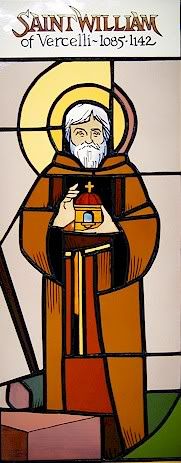 With the members of the Order growing more disgruntled, William humbly removed himself from the situation to remove controversy, and ensure the future of the order. He traveled to Naples, where he served as advisor to the King Roger I, and established several more monasteries.
With the members of the Order growing more disgruntled, William humbly removed himself from the situation to remove controversy, and ensure the future of the order. He traveled to Naples, where he served as advisor to the King Roger I, and established several more monasteries.
Saint William had complete trust in the Lord and in His Divine Providence. Ever faithful and contemplative, William was willing to leave his home as a youth, and subsequently leave the community he had built with his own hands in service to God. Patient, humble, and obedient, Saint William of Vercelli put the Lord’s work above his own desires at every moment of his life. We could do well by observing Saint William’s confidence in the Lord, and striving to imitate him by creating quiet moments in our own lives for prayer, reflection, and contemplation. It is in those moments that the Divine Plan for our own lives quietly unfolds… if we listen.
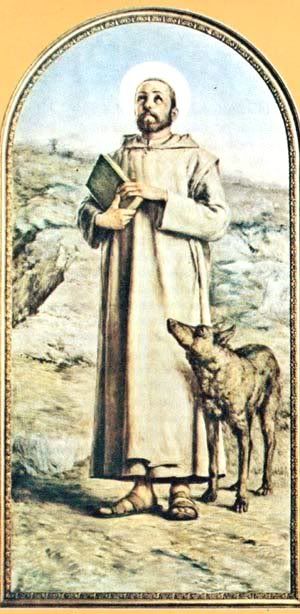 O God, Who hast set for us in Thy saints an example and a help to our weakness, to assist us to tread the path of salvation, grant us so to venerate the virtues of the blessed abbot William, that we may share in his prayers and follow in his footsteps. Through our Lord Jesus Christ, Thy Son, Who liveth and reigneth with Thee in the unity of the Holy Ghost, one God forever and ever. Amen.
O God, Who hast set for us in Thy saints an example and a help to our weakness, to assist us to tread the path of salvation, grant us so to venerate the virtues of the blessed abbot William, that we may share in his prayers and follow in his footsteps. Through our Lord Jesus Christ, Thy Son, Who liveth and reigneth with Thee in the unity of the Holy Ghost, one God forever and ever. Amen.
Inspired by the origins and spiritual history of the Holy Rosary, we continue our meditation on the psalms, one each day, in order, for 150 days.
Today’s Psalm: Psalm 61: Prayer of the King in Exile
1 Hear my cry, O God;
listen to my prayer.
2 From the ends of the earth I call to you,
I call as my heart grows faint;
lead me to the rock that is higher than I.
3 For you have been my refuge,
a strong tower against the foe.
4 I long to dwell in your tent forever
and take refuge in the shelter of your wings.
5 For you have heard my vows, O God;
you have given me the heritage of those who fear your name.
6 Increase the days of the king's life,
his years for many generations.
7 May he be enthroned in God's presence forever;
appoint your love and faithfulness to protect him.
8 Then will I ever sing praise to your name
and fulfill my vows day after day.
Day 176 of 365
Prayer Intentions: Quiet moments of contemplation; Open hearts to the Will of God.
Requested Intentions: For all lost children (I); Prosperity, health, healing, and conversion for a family (M); Health and healing of a mother (A); Healing of heart and mind (T); Healing of a new relationship before marriage (K); Healing of a relationship (T); Eternal rest for the dearly departed, end to financial struggles, successful sale of home, ability to travel on pilgrimage (L); For healing of a stomach illness (L); For the repose of the soul of a sister (C); Vocational security for family, Financial security for daughter beginning college (M); Vocational guidance, courage and strength (I); Health for an ailing nephew (A); Those suffering from depression (J); Successful adoption (S); Healing of a father battling cancer (S).
Psalm: Psalm 61: Prayer of the King in Exile
Born to nobility in Vercelli, Italy, William was orphaned at a young age when both his parents were killed. Subsequently raised by a pious family member, William matured into a contemplative young man with only one desire—to devote his life to the Lord. At the young age of 15, William left home, setting out on pilgrimage to Santiago de Compostela, Spain. As the journey was not difficult enough for him, he encircled his legs with tight iron bands, causing pain and making walking difficult, his suffering bringing him closer to God. Upon arrival, he worked some miracles including the healing of a blind man through prayer, and subsequently felt called to journey to the Holy Land. However, soon after departing, he was set upon by thieves, and following that encounter, felt the Will of God calling him to Italy.
Saint William retired to Monte Vergiliano (today known as Monte Vergine, named for Our Blessed Mother), and became a hermit. There, he spent his days in prayer, fasting, and contemplation of the Lord. Especially devoted to the Blessed Virgin Mary, he began construction of a church in her honor, mining the rocks from the mountain by hand with the assistance of a lone donkey. As holy legend tells us, one evening, the donkey was killed and eaten by a wolf. Saint William called the wolf to him, ordering it to take the donkey’s place. The wolf, bowing in respect, and realizing that it had interrupted the work of God, immediately took up the task of dragging rocks from the quarry. The faithful who continue to travel on pilgrimage to Monte Vergine report that the wolf is still spotted today, visible to those who call upon the name of the Blessed Virgin.
Eventually, due to his working of more miraculous cures (none of which he sought credit for), the faithful began seeking William out on his mountain. His reputation for holiness attracted many disciples, both men and women, and he founded the Order of Mount Vergine—a religious community with strict rules of austerity. William and the nuns and monks of his order lived in peace and contemplation for some time, until the members of the order began complaining that William’s rules of poverty, fasting, and penance were too extreme.
There is evidence of heavenly support for the austerities of William’s rule. For example, William did not permit the order to eat meat, eggs, milk, or cheese. If someone tried to violate this regulation, storm clouds would appear in the sky and the lightning would destroy the illicit foodstuff that had been brought into the monastery.
 With the members of the Order growing more disgruntled, William humbly removed himself from the situation to remove controversy, and ensure the future of the order. He traveled to Naples, where he served as advisor to the King Roger I, and established several more monasteries.
With the members of the Order growing more disgruntled, William humbly removed himself from the situation to remove controversy, and ensure the future of the order. He traveled to Naples, where he served as advisor to the King Roger I, and established several more monasteries.Saint William died of natural causes at the Guglielmo monastery near Nusco, Italy, where he was buried. Church tradition holds that William predicted the date and time of his death, and went to meet his Maker with peace and joy. At the time of his death, he had not yet written a Rule for his religious to govern their affairs. His successor, fearing the dissolution of a community without constitutions, placed them under the Rule of Saint Benedict. The community, which continues to exist today, now belongs to the Benedictine congregation of Subiaco, and has a much venerated picture of our Lady of Constantinople, to which pilgrimages are frequently made by the faithful. While Benedictine monks generally wear black robes, the monks who reside at Monte Vergine today continue to wear the white robes of the Williamites in honor of this holy man.
Saint William had complete trust in the Lord and in His Divine Providence. Ever faithful and contemplative, William was willing to leave his home as a youth, and subsequently leave the community he had built with his own hands in service to God. Patient, humble, and obedient, Saint William of Vercelli put the Lord’s work above his own desires at every moment of his life. We could do well by observing Saint William’s confidence in the Lord, and striving to imitate him by creating quiet moments in our own lives for prayer, reflection, and contemplation. It is in those moments that the Divine Plan for our own lives quietly unfolds… if we listen.
 O God, Who hast set for us in Thy saints an example and a help to our weakness, to assist us to tread the path of salvation, grant us so to venerate the virtues of the blessed abbot William, that we may share in his prayers and follow in his footsteps. Through our Lord Jesus Christ, Thy Son, Who liveth and reigneth with Thee in the unity of the Holy Ghost, one God forever and ever. Amen.
O God, Who hast set for us in Thy saints an example and a help to our weakness, to assist us to tread the path of salvation, grant us so to venerate the virtues of the blessed abbot William, that we may share in his prayers and follow in his footsteps. Through our Lord Jesus Christ, Thy Son, Who liveth and reigneth with Thee in the unity of the Holy Ghost, one God forever and ever. Amen.Inspired by the origins and spiritual history of the Holy Rosary, we continue our meditation on the psalms, one each day, in order, for 150 days.
Today’s Psalm: Psalm 61: Prayer of the King in Exile
1 Hear my cry, O God;
listen to my prayer.
2 From the ends of the earth I call to you,
I call as my heart grows faint;
lead me to the rock that is higher than I.
3 For you have been my refuge,
a strong tower against the foe.
4 I long to dwell in your tent forever
and take refuge in the shelter of your wings.
5 For you have heard my vows, O God;
you have given me the heritage of those who fear your name.
6 Increase the days of the king's life,
his years for many generations.
7 May he be enthroned in God's presence forever;
appoint your love and faithfulness to protect him.
8 Then will I ever sing praise to your name
and fulfill my vows day after day.
Day 176 of 365
Prayer Intentions: Quiet moments of contemplation; Open hearts to the Will of God.
Requested Intentions: For all lost children (I); Prosperity, health, healing, and conversion for a family (M); Health and healing of a mother (A); Healing of heart and mind (T); Healing of a new relationship before marriage (K); Healing of a relationship (T); Eternal rest for the dearly departed, end to financial struggles, successful sale of home, ability to travel on pilgrimage (L); For healing of a stomach illness (L); For the repose of the soul of a sister (C); Vocational security for family, Financial security for daughter beginning college (M); Vocational guidance, courage and strength (I); Health for an ailing nephew (A); Those suffering from depression (J); Successful adoption (S); Healing of a father battling cancer (S).
Psalm: Psalm 61: Prayer of the King in Exile
comments (0)
|
Labels:
Faith,
Feast Day,
Humility,
Obedience,
Patience,
Penance,
Prayer,
Saints,
Self-Denial,
Steadfastness
Subscribe to:
Comments (Atom)













